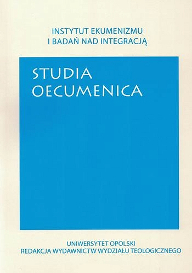Openness to interreligious dialogue – psychological antecedents and processes
Openness to interreligious dialogue – psychological antecedents and processes
Author(s): Dariusz Krok, Przemysław KrólSubject(s): Christian Theology and Religion, Psychology, Theology and Religion, Comparative Studies of Religion, Religion and science , History of Religion
Published by: Uniwersytet Opolski
Keywords: openness; interreligious dialogue; personality; religious attitudes; dialogue processes;
Summary/Abstract: The aim of this article is to examine the psychological antecedents and processes that play a crucial role in building and developing openness to interreligious dialogue. Two factors turn out to determine the ways in which interreligious dialogue is led: personality traits (agreeableness and openness to experience) and religious attitudes (intrinsic religiosity). They create an atmosphere of tolerance that is especially important in dialogue as it promotes the religious freedom that is a necessary condition for interreligious dialogue. The effectiveness of interreligious dialogue depends on the presence of personal and group factors which all contribute to the final outcome, e.g. genuine autonomy of religious motivation, the ability to differentiate between essential and peripheral elements in religion, or authenticity of religious beliefs connected with commitment. Moreover, they frequently interact with each other in influencing the final forms of interreligious dialogue.
Journal: Studia Oecumenica
- Issue Year: 2019
- Issue No: 19
- Page Range: 291-308
- Page Count: 18
- Language: English, Polish

